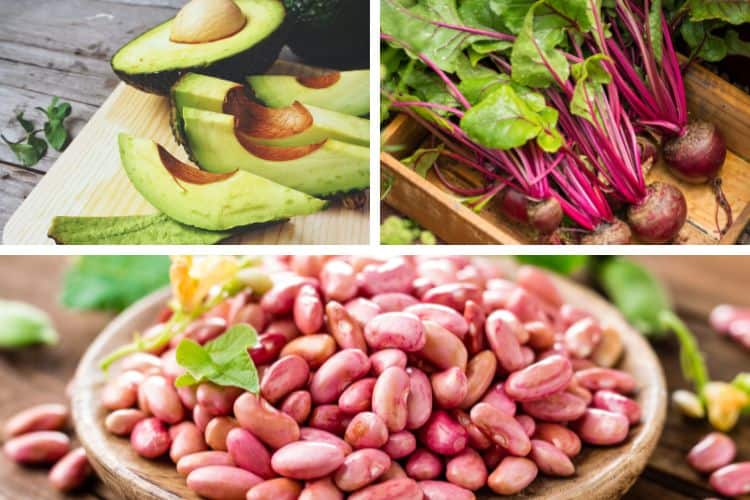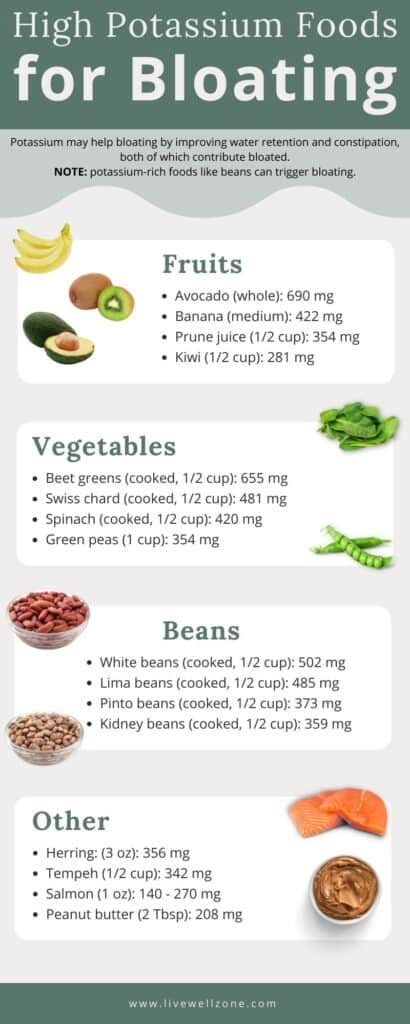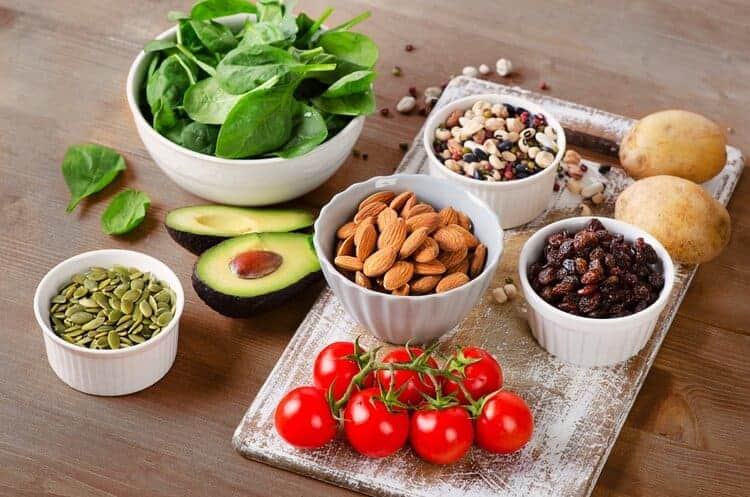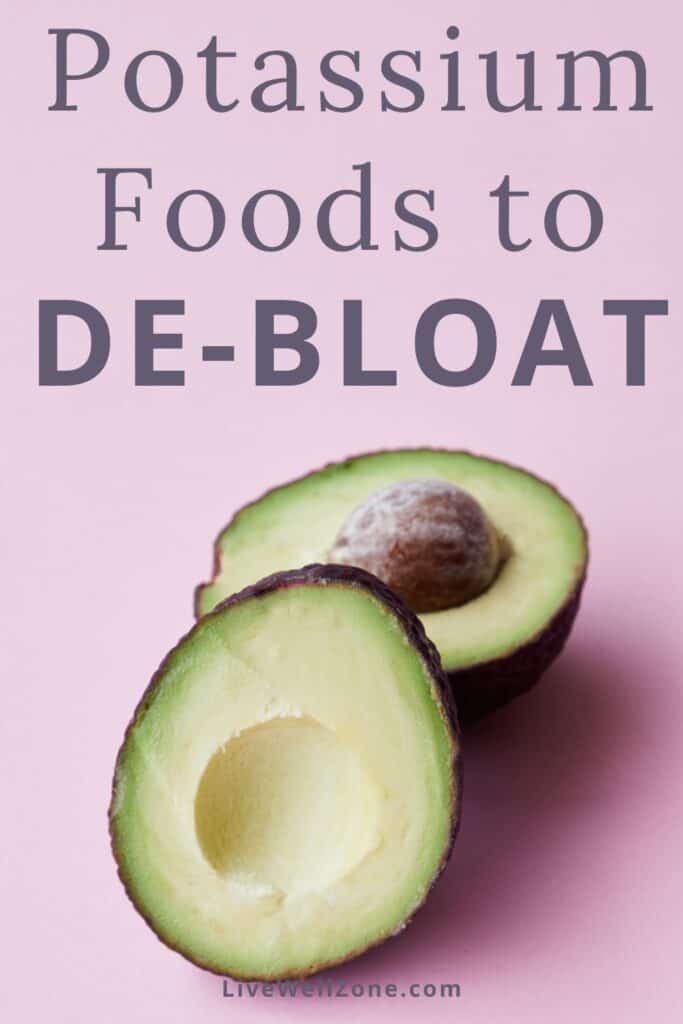
Although bloating can occur for multiple reasons – such as stress or hormonal imbalance – in some cases, it can be due to hypokalemia aka low potassium.
Potassium is a nutrient that affects the digestive system in multiple ways, especially when it comes to muscle contractions and water retention.
So, to help you get a better understanding about how all of this ties to bloating, this article will cover:
- the correlation between potassium and bloating.
- some of the best food sources of potassium.
- how much potassium you actually need for good health.
Let’s dive in!

CAN POTASSIUM REDUCE BLOATING?
Potassium can play a role in reducing bloating because it is essential for:
- Balancing fluid levels: potassium is responsible for maintaining fluid levels inside our cells, while sodium maintains fluid levels outside the cell (source). However, when we take in too much sodium or we have low potassium, we can end up with sodium inside our cells. Not only does this create an imbalance in the overall potassium-sodium ratio, but it leads to water retention and a bloated appearance.
- Peristalsis: peristalsis is a process that involves the contraction of muscles along the digestive tract. When these contractions occur in the colon, it allows us to get rid of waste. However, if we have low potassium – aka hypokalemia – those contractions don’t happen as easily. Ultimately, this leads to constipation and a bloated appearance.
So, by increasing your potassium intake you can bring more balance to the body’s sodium-potassium ratio, encourage the elimination of excess sodium and ease constipation, all of which helps to ease to bloating.
POTASSIUM-RICH FOODS TO REDUCE BLOATING

The richest source of potassium is plants, particularly fruits and vegetables. At the end of this section I’ve included a table with 27 potassium-rich foods that you can add to your diet (source).
Please keep in mind that these foods contain other compounds that can contribute to bloating in some people.
For example, beans contain raffinose, an indigestible starch that can trigger bloating and gas.
In addition, the lactose in dairy can also cause bloating for some people.
So, as you make changes to your diet, you’ll want to prioritize foods that are potassium-rich and agreeable for your particular digestive system.
| FOOD | POTASSIUM CONTENT |
|---|---|
| Avocado (whole) | 690 mg |
| Beet greens (cooked, 1/2 cup) | 655 mg |
| White beans (cooked, 1/2 cup) | 502 mg |
| Lima beans (cooked, 1/2 cup) | 485 mg |
| Swiss chard (cooked, 1/2 cup) | 481 mg |
| Potato (medium, baked with skin, 1/2) | 463 mg |
| Acorn squash (cooked, 1/2 cup) | 448 mg |
| Banana (medium) | 451 mg |
| Spinach (cooked, 1/2 cup) | 420 mg |
| Pinto beans (cooked, 1/2 cup) | 373 mg |
| Kidney beans (cooked, 1/2 cup) | 359 mg |
| Herring (3 oz) | 356 mg |
| Prune juice (1/2 cup) | 354 mg |
| Green peas (1 cup) | 354 mg |
| Carrot juice (pure, 1/2 cup) | 345 mg |
| Temped (1/2 cup) | 342 mg |
| Yogurt (nonfat, plain, 4 oz.) | 313 mg |
| Yogurt (low fat, plain, 4 oz.) | 287 mg |
| Sweet potato (cooked, 1/2 cup) | 286 mg |
| Kiwi (1/2 cup) | 281 mg |
| Portabella mushrooms (cooked, 1/2 cup) | 265 mg |
| Stewed tomatoes (canned, 1/2 cup) | 264 mg |
| Cantaloupe (1/2 cup) | 237 mg |
| Grapefruit (1/2 fruit) | 208 mg |
| Peanut butter (2 Tbsp) | 208 mg |
| Carrots (raw, 1/2 cup) | 205 mg |
| Salmon (1 oz) | about 140 – 270 mg |
CAN TOO MUCH POTASSIUM CAUSE BLOATING?
High potassium – aka hyperkalemia – can have an inhibitory effect on the muscular contractions in the digestive tract. As a result, the muscles of the colon become too weak to contract effectively. Ultimately, this can lead to digestive issues like bloating, gas, diarrhea and more (1, 2, 3).
Aside from the above, elevated potassium levels can also cause muscle cramps, weakness and irregular heartbeat (source).
FAQs ABOUT POTASSIUM FOR BLOATING
How much potassium should I take for bloating?
While there is no potassium dosage specifically for bloating, the Recommended Daily Intake for anyone 14 and above is 4700 mg (source).
CONCLUSION
Increasing your consumption of potassium-rich foods is one of the easiest remedies that you can try for bloating.
For some people, this can make a big difference in the level of discomfort they experience.
However, if this doesn’t improve your bloating, then you can also try looking at supplements to support gut health.
To understand what to look for in a supplement, read this guide on the best green powders for bloating.
In addition, if you usually experience bloating from vegetables, this article on how to reduce bloating from vegetables has some helpful tips.
Lastly, don’t forget to pay attention to the types of snacks you eat and use this list of 15 snacks to ease bloating.


